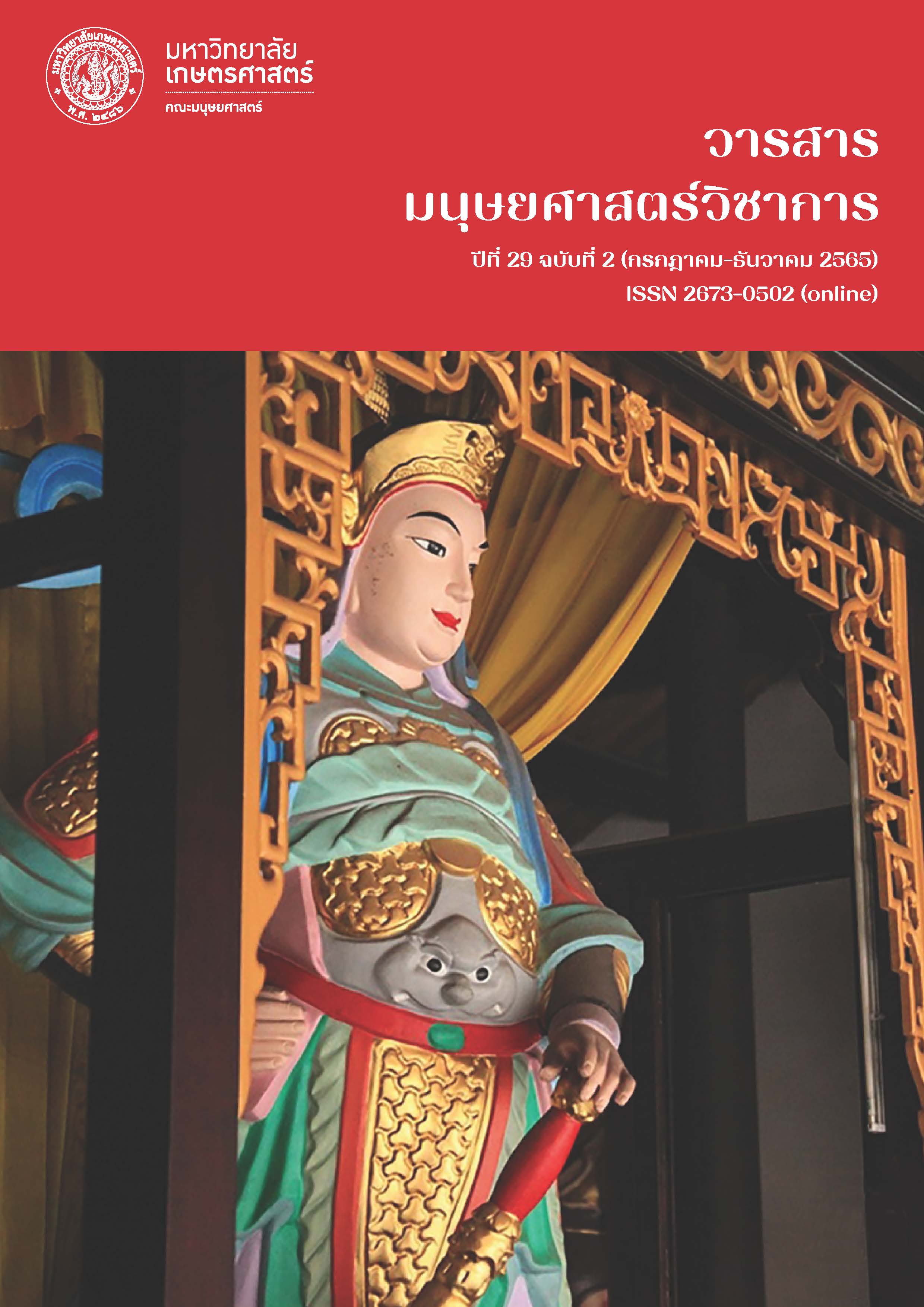The Development of a Board Game to Enhance the Classroom Management Learning of Students in the Faculty of Education, Kasetsart University
Main Article Content
Abstract
This article reports on a three-phase research and development study. The first phase aimed to identify the needs to enhance the classroom management learning of students in the Faculty of Education, Kasetsart University. The sample comprised students in the second semester of the academic year 2019 selected through a simple random sampling method and three groups of interviewees, namely teacher profession course lecturers, students, and basic education school teachers, selected through a purposive sampling method. The former completed a survey questionnaire, while the latter responded to interview questions. The data were analyzed using percentage, mean, standard deviation, and the priority needs index. It was found that the PNImodified was in the range of 0.231 to 0.301 with the highest value standing at 0.301 for the factors relating to lecturers. Also, the interview results revealed agreement between the three groups in their perceptions of the management of classroom experience for the students in terms of their preparedness, confidence, and ability to apply learning content to real-life situations prior to their professional internships.
The second phase of the study aimed to design and develop a board game to enhance the classroom management learning of students in the Faculty of Education, Kasetsart University. The sample comprised 40 purposively selected students in the academic year 2020.
The research instruments were a classroom management board game prototype and a board game improvement questionnaire. The findings showed that the board game was trialed and improved four times to ensure that the design fulfilled the research objectives and that it enabled the players (students) to develop classroom management understanding and knowledge.
The objective of the final phase was to examine the effects of the board game application on the classroom management learning of students in the Faculty of Education, Kasetsart University. The sample comprised 15 purposively selected students. The research instruments were the classroom management board game and a board game satisfaction survey questionnaire. The data were analyzed using percentage, mean, and standard deviation. Overall, the students were highly satisfied with the board game (X=4.33, S.D.=0.723). When the satisfaction criteria were analyzed individually, the ones receiving the highest ratings were the role of the board game in promoting classroom learning (X=4.66, S.D.=0.487), followed by the role of the board game in promoting student interaction (X=4.533, S.D.=0.516).
Article Details

This work is licensed under a Creative Commons Attribution-NonCommercial-NoDerivatives 4.0 International License.
References
กนกกร จีนา และอลงกรณ์ คูตระกูล. (2561). กระบวนการถ่ายทอดความรู้จากมหาวิทยาลัยสู่ชุมชน: กรณีศึกษาโครงการอนุรักษ์วิหารพระเจ้าพันองค์ วัดปงสนุก จังหวัดลำปาง. วารสารรัฐศาสตร์และรัฐประศาสนศาสตร์, 9(1), 59-80.
กาญจนา ไชยพันธุ์. (2549). กระบวนการกลุ่ม. กรุงเทพฯ: โอเดียนสโตร์.
ชนันภรณ์ อารีกุล. (2563). การพัฒนานวัตกรรมการเรียนรู้แบบเกมกระดานเพื่อเสริมสร้างความเป็นพลเมืองที่เข้มแข็งของนิสิตระดับปริญญาตรี. วารสารปัญญาปณิธาน, 5(2), 137-150.
ณิรดา เวชญาลักษณ์ และธัญญาพร ก่องขันธ์. (2562). แนวปฏิบัติการบริหารจัดการชั้นเรียนของครูปฐมวัยตามแนวห้องเรียนคุณภาพโรงเรียนขนาดเล็กที่จัดการศึกษาระดับปฐมวัย สังกัดสำนักงานเขตพื้นที่การศึกษาประถมศึกษาพิษณุโลก เขต 2. วารสารบัณฑิตศึกษา มหาวิทยาลัยราชภัฏสกลนคร, 16(73), 23-30.
ทิศนา แขมมณี. (2552). ศาสตร์การสอน. กรุงเทพฯ: ด่านสุทธาการพิมพ์.
นภาศรี สงสัย. (2563). การศึกษาผลการใช้บอร์ดเกมประกอบการเรียนการสอนรายวิชาวิทยาศาสตร์ เรื่องระบบนิเวศ
เพื่อส่งเสริมความสามารถในการคิดวิเคราะห์ สำหรับนักเรียนชั้นมัธยมศึกษาปีที่ 3 โรงเรียนศรีสำโรงชนูปถัมภ์. วารสารอิเล็กทรอนิกส์สื่อนวัตกรรมและการศึกษาเชิงสร้างสรรค์, 3(2), 1-11.
พนิดา ชาตยาภา. (2559). การพัฒนาความคิดสร้างสรรค์ของนักศึกษาสาขาวิชาการศึกษาปฐมวัยโดยใช้แผนที่ทางความคิด. วารสารวิจัยและพัฒนา วไลยอลงกรณ์ ในพระบรมราชูปถัมภ์ สาขามนุษยศาสตร์และสังคมศาสตร์, 11(2), 307-321.
พระครูสิริธรรมนิเทศ, พระครูวิภัชธรรมวิจิตร และจักรี บางประเสริฐ. (2563). การจัดการชั้นเรียนในยุคการศึกษาเปลี่ยนแปลง. วารสารสิรินธรปริทรรศน์, 21(2), 369-376.
พิมพาพัญ ทองกิ่ง. (2563). บทบาทครูกับการจัดบรรยากาศชั้นเรียนเชิงบวกในศตวรรษที่ 21. ศึกษาศาสตร์สาร มหาวิทยาลัยเชียงใหม่, 4(1), 50-59.
ภูมิภควัธจ์ ภูมพงศ์คชศร. (2563). การบริหารจัดการชั้นเรียนเพื่อพัฒนาทักษะการเรียนรู้ในศตวรรษที่ 21. วารสารสหวิทยาการมนุษยศาสตร์และสังคมศาสตร์, 3(3), 591-600.
สันติ บุญภิรมย์. (2557). การบริหารจัดการในห้องเรียน. กรุงเทพฯ: ทริปเพิ้ล เอ็ดดูเคชั่น.
สาโรช โศภีรักข์. (2546). นวัตกรรมการสอนที่ยึดผู้เรียนเป็นสำคัญ. กรุงเทพฯ: บุ๊คพอยท์.
สุคนธ์ สินธพานนท์. (2553). นวัฒกรรมการเรียนการสอนเพื่อพัฒนาคุณภาพของเยาวชน การใช้เกมประกอบการสอน. กรุงเทพฯ: 9119 เทคนิคพริ้นตริ้ง.
สุรางค์ โค้วตระกูล. (2556). จิตวิทยาการศึกษา. กรุงเทพฯ: จุฬาลงกรณ์มหาวิทยาลัย.
Garris, R., & Ahlers, R. (2002). Driskell,. JE 2002. Games, motivation and learning. Simulation & gaming:
An interdisciplinar. Journal of Theory, Practice and Research, 33(4).
Moore, Kenneth D. (2007). Classroom teaching skills: McGraw-Hill Humanities, Social Sciences & World Languages (6th ed.). New York City: McGraw-Hill.
Pho, A., & Dinscore, A. (2015). Game-based learning. Tips and Trends, Spring, 1-5.
Triboni, E., & Weber, G. (2018). MOL: Developing a European-Style Board Game to Teach Organic Chemistry. Journal of Chemical Education, 95(5), 791-803.


